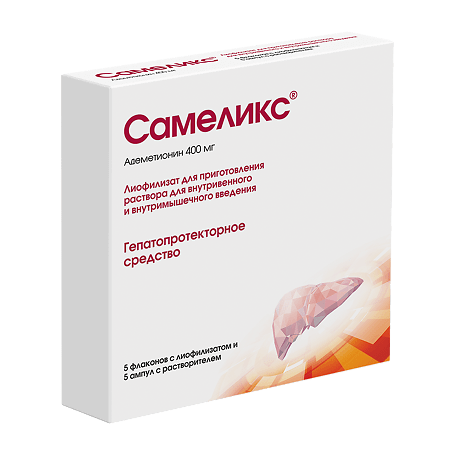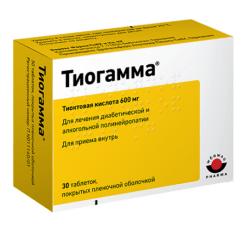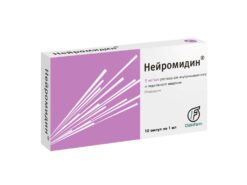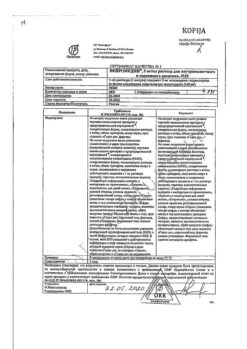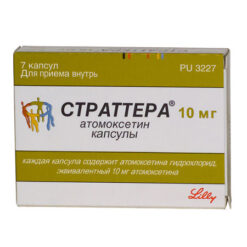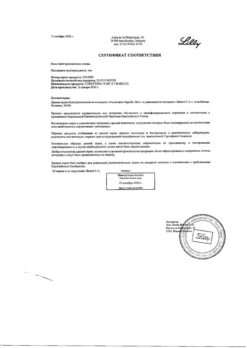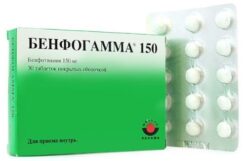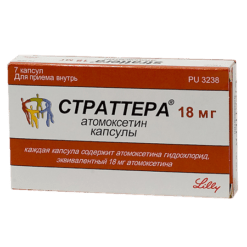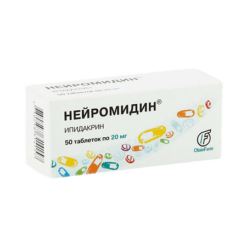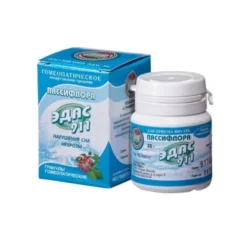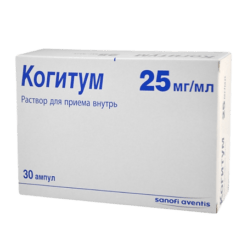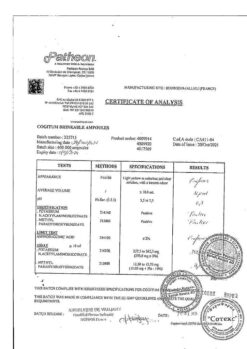No products in the cart.
Samelix, lyophilizate 400 mg 5 pcs
€40.28 €34.91
Description
Hepatoprotector, has antidepressant activity. It has choleretic and cholekinetic effect. It has detoxifying, regenerating, antioxidant, antifibrotic and neuroprotective properties.
Makes up for the lack of ademetionine and stimulates its production in the body, especially in the liver and brain. S-adenosyl-L-methionine (ademetionine) is a donor of methyl groups in biological reactions of methylation of phospholipids of cell membranes, proteins, hormones and neurotransmitters; It participates in transsulfation reactions as a precursor of cysteine, taurine, glutathione (provides redox mechanism of cellular detoxification), acetylation coenzyme.
Enhances glutamine in the liver, cysteine and taurine in the plasma; decreases methionine in the serum, normalizing metabolic reactions in the liver. Except decarboxylation it participates in processes of aminopropylation as precursor of polyamines – putrescine (stimulator of cell regeneration and proliferation of hepatocytes), spermidine and spermin, entering the structure of ribosomes.
It has choleretic effect caused by increase of motility and polarization of hepatocyte membranes due to stimulation of phosphatidylcholine synthesis in them. This improves function of bile acid transport systems associated with hepatocyte membranes and promotes bile acid passage into bile-excretory system. It is effective in intradolocular variant of cholestasis (disorder of bile synthesis and flow).
It promotes detoxification of bile acids, increases the content of conjugated and sulfated bile acids in hepatocytes. Conjugation with taurine increases the solubility of bile acids and their excretion from the hepatocyte. The process of sulfation of bile acids promotes the possibility of their elimination by the kidneys and facilitates their passage through the hepatocyte membrane and excretion with bile.
In addition, sulfated bile acids protect liver cell membranes from toxic effects of nonsulfated bile acids (in high concentrations present in hepatocytes with intrahepatic cholestasis). In patients with diffuse liver diseases (cirrhosis, hepatitis) with intrahepatic cholestasis syndrome it reduces severity of skin itching and changes of biochemical indices, including level of direct bilirubin, alkaline phosphate activity, aminotransferases.
Pharmacokinetics
Indications
Indications
Intrahepatic cholestasis in pre-cirrhotic and cirrhotic conditions, which can be observed in the following diseases:
– fatty liver;
– chronic hepatitis;
– toxic liver damage of various etiologies, including alcohol, viral, drugs (antibiotics, antitumor, anti-tuberculosis and antiviral drugs, tricyclic antidepressants, oral contraceptives);
– chronic acalculous cholecystitis;
– cholangitis;
– cirrhosis of the liver;
– encephalopathy, incl. associated with liver failure (alcoholic, etc.);
Intrahepatic cholestasis in pregnant women;
Symptoms of depression.
Pharmacological effect
Pharmacological effect
Hepatoprotector, has antidepressant activity. It has choleretic and cholekinetic effects. It has detoxifying, regenerating, antioxidant, antifibrosing and neuroprotective properties.
Replenishes ademetionine deficiency and stimulates its production in the body, primarily in the liver and brain. Participates in biological transmethylation reactions (methyl group donor) – the S-adenosyl-L-methionine molecule (ademetionine), is a methyl group donor in methylation reactions of phospholipids of cell membranes, proteins, hormones, neurotransmitters; participates in transsulfation reactions as a precursor of cysteine, taurine, glutathione (provides a redox mechanism for cellular detoxification), and acetylation coenzyme.
Increases the content of glutamine in the liver, cysteine and taurine in plasma; reduces the content of methionine in serum, normalizing metabolic reactions in the liver. In addition to decarboxylation, it participates in the processes of aminopropylation as a precursor of polyamines – putrescine (stimulator of cell regeneration and proliferation of hepatocytes), spermidine and spermine, which are part of the structure of ribosomes.
It has a choleretic effect due to increased mobility and polarization of hepatocyte membranes due to stimulation of the synthesis of phosphatidylcholine in them. This improves the function of bile acid transport systems associated with hepatocyte membranes and promotes the passage of bile acids into the biliary system. Effective for intralobular cholestasis (impaired synthesis and flow of bile).
Promotes detoxification of bile acids, increases the content of conjugated and sulfated bile acids in hepatocytes. Conjugation with taurine increases the solubility of bile acids and their removal from the hepatocyte. The process of sulfation of bile acids facilitates their elimination by the kidneys, facilitates their passage through the hepatocyte membrane and excretion in the bile.
In addition, sulfated bile acids protect liver cell membranes from the toxic effects of non-sulfated bile acids (present in high concentrations in hepatocytes during intrahepatic cholestasis). In patients with diffuse liver diseases (cirrhosis, hepatitis) with intrahepatic cholestasis syndrome, it reduces the severity of skin itching and changes in biochemical parameters, incl. level of direct bilirubin, alkaline phosphatase activity, aminotransferases.
Pharmacokinetics
Special instructions
Special instructions
Use ademetionine with caution in patients with renal failure, with bipolar disorders, simultaneously with selective serotonin reuptake inhibitors, tricyclic antidepressants (such as clomipramine); herbal preparations and preparations containing tryptophan; in elderly patients.
Insufficiency of vitamin B12 and folic acid can lead to a decrease in ademetionine concentrations, so their concomitant use in normal doses is recommended.
Patients with depression require careful monitoring and ongoing psychiatric care when treated with ademetionine to monitor the effectiveness of treatment.
When used in patients with cirrhosis of the liver against the background of hyperazotemia, systematic monitoring of nitrogen levels in the blood is necessary. During long-term therapy, it is necessary to determine the content of urea and creatinine in the blood serum.
Impact on the ability to drive vehicles and operate machinery
Dizziness may occur when using ademetionine. Patients should not drive or operate machinery until symptoms that may affect reaction time during these activities have completely resolved.
Active ingredient
Active ingredient
Ademetionine
Composition
Composition
1 bottle of lyophilisate contains:
Active ingredient:
ademetionine 1,4-butane disulfonate 760.0 mg, calculated as ademetionine 400.0 mg.
1 ampoule of solvent contains:
L-lysine monohydrate 384.5 mg, equivalent to L-lysine 342.4 mg,
sodium hydroxide solution 1 M to pH 9.8-10.3,
water for injections up to 5 ml.
Pregnancy
Pregnancy
In the first and second trimesters of pregnancy, ademetionine is used only in cases of extreme necessity, when the expected benefit to the mother outweighs the potential risk to the fetus. The use of ademetionine in high doses in the third trimester of pregnancy did not cause any undesirable effects.
The use of ademetionine during breastfeeding is possible only if the expected benefit to the mother outweighs the potential risk to the child.
Contraindications
Contraindications
Genetic disorders affecting the methionine cycle and/or causing homocystinuria and/or hyperhomocysteinemia (cystathionine beta synthase deficiency, impaired metabolism of vitamin B12);
Hypersensitivity to any of the components of the drug;
Age up to 18 years (experience of medical use in children is limited).
With caution
Bipolar disorders.
Pregnancy (first trimester) and breastfeeding period (use is possible only if the potential benefit to the mother outweighs the possible risk to the fetus and child).
Concomitant use with selective serotonin reuptake inhibitors (SSRIs), tricyclic antidepressants (such as clomipramine), as well as herbal drugs and drugs containing tryptophan.
Old age.
Kidney failure.
Side Effects
Side Effects
From the digestive system: often – nausea, abdominal pain, diarrhea; rarely – vomiting, dry mouth, esophagitis, dyspepsia, flatulence, gastrointestinal pain, gastrointestinal bleeding, hepatic colic.
From the nervous system: rarely – confusion, insomnia, dizziness, headache, paresthesia.
From the musculoskeletal system: rarely – arthralgia, muscle cramps.
From the urinary system: rarely – urinary tract infections.
From the skin: rarely – hyperhidrosis, itching, skin rash.
Local reactions: rarely – reactions at the injection site; very rarely – reactions at the injection site, skin necrosis at the injection site.
Allergic reactions: rarely – anaphylactic reactions; very rarely – Quincke’s edema, laryngeal edema.
Other: rarely – hot flashes, superficial phlebitis, asthenia, chills, flu-like symptoms, weakness, peripheral edema, hyperthermia.
Interaction
Interaction
There is a report of the development of serotonin syndrome in a patient who used ademetionine and clomipramine.
Ademetionine should be used with caution simultaneously with selective serotonin reuptake inhibitors, tricyclic antidepressants, drugs and herbal remedies containing tryptophan.
Recommendations for use
Recommendations for use
Apply orally, intramuscularly or intravenously (very slowly).
When taken orally, the daily dose is 800-1600 mg.
When administered intravenously or intramuscularly, the daily dose is 400-800 mg.
The duration of treatment is determined individually depending on the severity and course of the disease.
In elderly patients, it is recommended to start treatment with the lowest recommended dose, taking into account decreased hepatic, renal or cardiac function, the presence of concomitant pathological conditions and the use of other drugs.
Manufacturer
Manufacturer
Firm Enzyme LLC, Russia
Additional information
| Manufacturer | Firm Ferment, Russia |
|---|---|
| Medication form | lyophilizate |
| Brand | Firm Ferment |
Related products
Buy Samelix, lyophilizate 400 mg 5 pcs with delivery to USA, UK, Europe and over 120 other countries.

